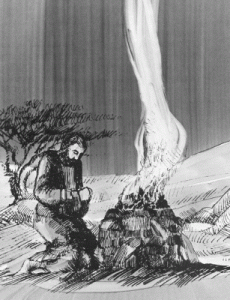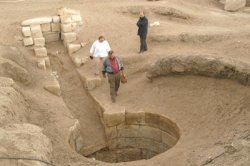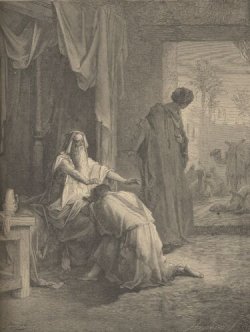Genesis 24-36
 Although 12 great princes and semitic races sprang forth from the line of Ishmael, the son of Abraham and Hagar (Sarah’s handmaiden), the birthright passed to Abraham and Sarah’s son, Isaac. The “birthright” in this case means more than an inheritance of property. It identifies the lineage of God’s covenant people, whose mission it is to be a light unto the world.
Although 12 great princes and semitic races sprang forth from the line of Ishmael, the son of Abraham and Hagar (Sarah’s handmaiden), the birthright passed to Abraham and Sarah’s son, Isaac. The “birthright” in this case means more than an inheritance of property. It identifies the lineage of God’s covenant people, whose mission it is to be a light unto the world.
Being a covenant people involves faithfulness as well as blood lineage. Thus, as Nephi said, repentance and faith in the Holy One of Israel is what determines whether one is of the covenant (see 2 Nephi 30:2 ), a concept also taught by Paul (see Romans 2:28–29 ). In other words, while the blood lineage is significant, it can be overridden by one’s own faithfulness or lack of such. As Jesus would say, “Bring forth therefore fruits worthy of repentance, and begin not to say within yourselves, We have Abraham to our father: for I say unto you, That God is able of these stones to raise up children unto Abraham” (Luke 3:8).
“It appears that anciently under the Patriarchal Order certain special blessings, rights, powers, and privileges—collectively called the birthright —passed from the father to his firstborn son. ( Genesis 43:33 .) In later ages special blessings and prerogatives have been poured out upon all the worthy descendants of some who gained special blessings and birthrights anciently. ( 3 Nephi 20:25–27 .) Justification for this system, in large part, lies in the pre-existent preparation and training of those born in the lines destined to inherit preferential endowments.” ( Mormon Doctrine, p. 87.)
In the patriarchal order this birthright was passed from father to son, who was often, but not always, the eldest son. Righteousness was a more important factor than being the firstborn.
From chronological information in Genesis and the book of Moses it is estimated that Isaac was born approximately 1900 B.C. Isaac was forty years of age when he married Rebekah. Esau and Jacob were born twenty years later, or about 1840 B.C. Jacob’s flight to Padan-aram, or Haran, likely occurred about 1800 B.C. , which means the twelve sons would have been born between 1800 B.C. and 1780 B.C. In the line of Adam’s royal generations Abraham was the twentieth, Isaac the twenty-first, and Jacob the twenty-second.
It appears that Isaac spent his life in the Negev desert, not travelling farther north than Jerusalem, or Mt. Moriah. The Negev responds to agricultural pursuits that harmonize with its arid character. It appears that Isaac, a herdsman, and his large household found sufficient pasture and other means of subsistence there. They had to move about, however, because of famines that occurred. Centuries of conflict, neglect, and natural causes have since turned the Negev into a barren area that covers nearly half of modern Israel. In recent years the Israelis have been turning the Negev into a productive area once again.
Chiefly, Isaac lived in three areas of the Negev: Beer-lahai-roi, Gerar, and Beersheba. Like his father, Isaac dug many wells. His tribe and flocks often went where the water was to be found. Isaac was a peaceful man, according to the record, choosing to move on and dig new wells rather than fight for the ones he had already dug. The Lord prospered him exceedingly. Isaac’s clan established Beersheba, and the community since then has always been associated with his name. Beersheba is fifty miles south of Jerusalem and in Old Testament times marked the southern border of the Judean kingdom.
Finding a Wife for Isaac
Genesis 24
Carrying on the covenant of Abraham brought with it much responsibility. Most people comprehend that Abraham was a chosen servant and a righteous one, and that his lineage is responsible to be a light unto the world, gathering people unto the Lord’s kingdom. But the Abrahamic covenant goes farther than that. It promises “eternal increase” and has a great deal to do with eternal marriage. The marriage union of Abraham and Sarah was always meant to be an eternal one. Isaac would also need to find a wife who would be his eternal equal. In verse 60 it says, “Be thou the mother of thousands of millions.”
The Joseph Smith translation of the Bible says that Rebekah was more than a pretty girl. “And the damsel being a virgin, very fair to look upon, such as the servant of Abraham had not seen, neither had any man known the like unto her . . .” ( JST, Genesis 24:16 ). Genesis 24 also says that when Abraham’s servant arrived, “…she went down to the well, and filled her pitcher, and came up.” Rebekah’s service signified her great spirit. She was beautiful inside and out. Many artists have depicted the wells of Israel as the wells of Europe — a brick circle above ground down into which one can lower a bucket or jar.
 But most of the ancient wells of the Holy Land are really cisterns, large cavities in the rock into which one must descend. Many have steps carved into the stone along the wall. The steps are narrow and slippery, and women descended them with heavy pitchers on their shoulders. It appears that Rebekah did this over and over in order to water the servant’s camels.
But most of the ancient wells of the Holy Land are really cisterns, large cavities in the rock into which one must descend. Many have steps carved into the stone along the wall. The steps are narrow and slippery, and women descended them with heavy pitchers on their shoulders. It appears that Rebekah did this over and over in order to water the servant’s camels.
Rebekah followed the promptings of the Holy Spirit and displayed her great faith through her willingness to go with Abraham’s servant, leaving her family and security behind. It was certainly a leap of faith. When the Holy Ghost arranges marriages, they are surely marriages “made in heaven,” and Isaac and Rebekah loved each other.
Jacob
Jacob was the younger fraternal twin to Esau. The story of Jacob usurping or “stealing” Esau’s birthright is well known, but the story in the Bible leaves much to the imagination. The Bible says that Esau “despised” his birthright, and that is certainly why he lost it. The human failings of Isaac, Rebekah, Jacob, and Esau are apparent in the Genesis account, and even that has an important message. Even prophets see “through a glass, darkly” in their own affairs. Even they must walk by faith.

Isaac Blessing Jacob by Gustav Dore
One thing is perfectly clear. Priesthood holders are given the keys to bind and loose on earth and have that action validated in heaven (see Matthew 16:19 ). Isaac thought he was giving a final patriarch’s blessing to Esau, but Jacob had costumed himself to supplant Esau. Isaac, whose eyesight was failing due to his advanced age, inadvertently gave the birthright blessing to the younger brother, Jacob, who was favored by Rebekah, but also by the Lord. Once Isaac learned of the deception, however, he could have revoked the blessing and given it to Esau. Instead, he told Esau, “Yea, and he shall be blessed” ( Genesis 27:33 ). Later, when Jacob was preparing to leave for Padan-aram to escape Esau’s wrath, Isaac clearly gave him the blessing of Abraham (see Genesis 28:3–4 ), an additional proof that Jacob received the blessing meant for him and that Isaac confirmed it upon him. Thus, if the Genesis record is correct as it now is, Jacob, like others, received a call and a promise of eventual blessings because of his potential and in spite of his weaknesses. Like anyone, he had then to live worthily in order to obtain the promised blessings.
Isaac and Rebekah’s two sons should certainly have been faithful in the covenant, but Esau married out of the fold and strayed. His descendants are the Edomites. It was imperative that Jacob should marry within the covenant. For Jacob’s safety and for his future, Rebekah sent him to the house of Laban, where he could dwell among people of the covenant — away from his vengeful brother and away from the daughters of Heth and their wordly ways. The scriptures call Jacob a “plain” man, but the adjective really means “whole, perfect” (Genesis 25:27).
Genesis 28:10–19 . The Vision of Jacob’s Ladder at Bethel
Two comments by latter-day prophets give a greater understanding of the significance and meaning of Jacob’s experience at Bethel. The Prophet Joseph Smith said, speaking of Paul’s comment about one who was caught up to the third kingdom (see 2 Corinthians 12:2 ), “Paul ascended into the third heavens, and he could understand the three principal rounds of Jacob’s ladder—the telestial, the terrestrial, and the celestial glories or kingdoms” ( Teachings, pp. 304–5).
President Marion G. Romney explained why this vision of heaven was shown in the form of a ladder and why the name of the place where it happened was called Bethel:
“When Jacob traveled from Beersheba toward Haran, he had a dream in which he saw himself on the earth at the foot of a ladder that reached to heaven where the Lord stood above it. He beheld angels ascending and descending thereon, and Jacob realized that the covenants he made with the Lord there were the rungs on the ladder that he himself would have to climb in order to obtain the promised blessings—blessings that would entitle him to enter heaven and associate with the Lord.
“Because he had met the Lord and entered into covenants with him there, Jacob considered the site so sacred that he named the place Bethel, a contraction of Beth-Elohim, which means literally ‘the House of the Lord.’ He said of it: ‘. . . this is none other but the house of God, and this is the gate of heaven.’ ( Genesis 28:17 .)
“Jacob not only passed through the gate of heaven, but by living up to every covenant he also went all the way in. Of him and his forebears Abraham and Isaac, the Lord has said: ‘. . . because they did none other things than that which they were commanded, they have entered into their exaltation, according to the promises, and sit upon thrones, and are not angels but are gods.’ ( Doctrine and Covenants 132:37 .)
There is an important message here for Christians who believe that our works make no difference whatsoever to the Lord. Jacob ascended to the heavenly realm and spoke with the Lord face to face because of his righteous diligence in keeping all the commandments of God.
The Lord prospered Jacob as he labored in Laban’s household. Soon after Jacob’s arrival there, he fell in love with Rachel and worked seven years so he could marry her. But Laban had substituted his older daughter Leah both in the marriage ceremony and the marriage bed. Jacob, bitterly deceived, still agreed to work seven more years for Laban. At least he won Rachel at the beginning of this second period of labor, rather than at the end. Jacob’s two wives were just the beginning of his family, as he also fathered children by their handmaidens. There was much family jealousy, and Jacob had to deal with that as well as the possibility of violence from Esau, should he return home.
Wrestling with an Angel
The story of Jacob “wrestling” with an angel is a famous one. Genesis 32 says,
And Jacob was left alone; and there wrestled a man with him until the breaking of the day. And when he saw that he prevailed not against him, he touched the hollow of his thigh; and the hollow of Jacob’s thigh was out of joint, as he wrestled with him. And he said, Let me go, for the day breaketh. And he said, I will not let thee go, except thou bless me.
And he said unto him, What is thy name? And he said, Jacob. And he said, Thy name shall be called no more Jacob, but Israel: for as a prince hast thou power with God and with men, and hast prevailed. And Jacob asked him, and said, Tell me, I pray thee, thy name. And he said, Wherefore is it that thou dost ask after my name? And he blessed him there. And Jacob called the name of the place Peniel: for I have seen God face to face, and my life is preserved.
Jacob’s struggles with the Lord may have been spiritual, and Jacob may have demanded his “calling and election.” To have one’s “calling and election made sure” is to be sealed up to eternal life, or to receive the sure guarantee of being saved in the highest heaven after death. The Lord touched Jacob’s inner thigh, and His power disjointed Jacob’s hip and withered the thigh ligament. Jacob may have demanded that the covenant be sealed by the “yarek oath,” wherein one person touched the inner thigh of the other as a token of a covenant. Jews still do not eat the meat of an animal’s thigh unless this ligament has been removed, in honor of the covenant the Lord made with Jacob.
Jacob was renamed Israel by the Lord. He eventually fathered twelve sons, whose offspring became the Twelve Tribes of Israel. Here are the mothers and their sons:
| Leah | Reuben | See a son | Joy for having a son (see Genesis 29:32 ). |
| Leah | Simeon | Hearing | Because the Lord heard that she was hated (see Genesis 29:33 ). |
| Leah | Levi | Joined | “This time will my husband be joined unto me” ( Genesis 29:34 ). |
| Leah | Judah | Praise | “Now I will praise the Lord” ( Genesis 29:35 ). |
| Bilhah | Dan | Judging | “God hath judged me” ( Genesis 30:6 ). |
| Bilhah | Naphtali | Wrestling | “With great wrestlings have I wrestled with my sister” ( Genesis 30:8 ). |
| Zilpah | Gad | Troop | “Leah said, A troop cometh” ( Genesis 30:11 ). |
| Zilpah | Asher | My happiness | “Leah said, Happy am I” ( Genesis 30:13 ). |
| Leah | Issachar | A reward | God hath given me my reward ( Genesis 30:18 ). |
| Leah | Zebulun | Dwelling | “Now will my husband dwell with me” ( Genesis 30:20 ). |
| Rachel | Joseph | Adding | “The Lord shall add to me another son” ( Genesis 30:24 ). |
| Rachel | Benjamin | Son of my right hand | “You are the son of my right hand” (see Genesis 35:18 ). |
Reuben was the first-born son of Jacob, but he forfeited his birthright because of his immoral behavior. Simeon and Levi also tainted themselves by committing the great sin of slaughtering the people of Shechem in order to retrieve their disgraced sister, Dinah. The birthright passed then to Joseph, the firstborn of Jacob’s second, and most beloved wife, Rachel.
The inclusion of the brief account of Reuben’s immorality in the historical account may seem unusual, but it explains why Reuben, the firstborn of Leah, forfeited the birthright. Since Rachel was the second wife, her firstborn would then by right inherit the forfeited blessing. Joseph thus was the next legal heir in line, even though he was the eleventh son born. ( 1 Chronicles 5:1–3 specifically ties Reuben’s loss of the birthright to his transgression and shows how it went to Joseph.) The firstborn sons of the handmaids, Bilhah and Zilpah, would not be considered since they were the property of their mistresses and their children were also technically considered Rachel’s and Leah’s property.
Next article: Joseph
*This article was adapted from the LDS Institute Old Testament Manual.
